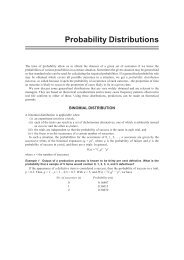International-Business-Dr-R-Chandran-E-book
International-Business-Dr-R-Chandran-E-book
International-Business-Dr-R-Chandran-E-book
Create successful ePaper yourself
Turn your PDF publications into a flip-book with our unique Google optimized e-Paper software.
129<br />
<strong>International</strong> <strong>Business</strong>- <strong>Dr</strong>. R. <strong>Chandran</strong><br />
special issues faced by MNCs when investing abroad. It involves the<br />
possibility of losses due to country-specific economic, political and social<br />
events.<br />
Among the country risks that are faced by MNCs are those related to<br />
the local economy, those due to the possibility of confiscation i.e.<br />
government takeover without any compensation, and those due to<br />
expropriation i.e. government takeover without any compensation, and those<br />
due to expropriation i.e government takeover with compensation which at<br />
times can be generous. In addition there are the political/social risks of wars,<br />
revolutions and insurrections. Even though none of these latter events are<br />
specifically directed towards an MNC by the foreign government, they can<br />
damage or destroy an investment. There are also risks of currency nonconvertibility<br />
and restrictions on the repatriation of income. <strong>International</strong><br />
magazines like Euro Money and The Economist regularly conduct country<br />
risk evaluations in order to facilitate MNCs.<br />
Methods of Reducing Country Risk and Control<br />
1. Controlling crucial elements of corporate operations<br />
Many MNCs try to prevent operations in developing countries by other local<br />
entities without their element of operations. For example, food and soft drink<br />
manufacturers keep their special ingredients secret. Automobile companies<br />
may produce vital parts such as engines in some other country and refuse to<br />
supply these parts if their operations are seized.<br />
2. Programmed stages of planned disinvestment<br />
An alternative technique for reducing the probability of expropriation is for<br />
the MNC to promise to hand over ownership and control to local people in<br />
the future. This is sometimes a requirement of the host government. There is<br />
a calculative move to involve themselves in stages.<br />
3. Joint ventures<br />
Instead of promising shared ownership in the future, an alternative technique<br />
for reducing the risk of expropriation is to share ownership with private or<br />
official partners in the host country from the very beginning. Such shared<br />
ownerships, known as joint ventures rely on the reluctance of local partners,<br />
if private, to accept the interference of their own government as a means of<br />
reducing expropriation. When the partner is the government itself, the<br />
Only for Private Circulation





